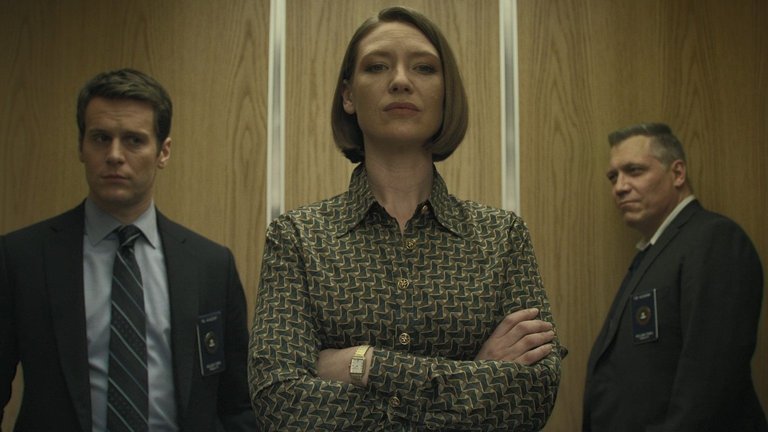
Serial killers are an exceptionally rich inspiration for authors of crime films or TV series, but precisely because of this, they are overused and come with a truckload of irritating clichés. One of the rare series that attempts to engage with this phenomenon in a somewhat original way is Mindhunter, which, in its quest to be “different”, returns to the source. And that source, at least in the modern understanding of the term, is John E. Douglas, a former FBI agent known for co-creating the modern concept of the serial killer and criminal profiling with his colleague Robert Ressler in the 1970s. Douglas, who served as a technical consultant for the authors of The Silence of the Lambs, retired from the FBI in 1995 and that same year chronicled his experiences in the book Mindhunter: Inside the FBI’s Elite Serial Crime Unit. The most fascinating part of the book isn’t so much Douglas’s account of his own life and career, but his detailed analysis of the most notorious serial murder cases and the years-long conversations he held with their perpetrators in prisons and hospitals to uncover their motives—or to equip himself and other researchers with tools to predict, prevent, and solve crimes.
Douglas has had an extraordinary influence on Hollywood over the past decades, serving as inspiration for numerous characters in films and TV shows about criminal profiling, most famously with Criminal Minds. It was only a matter of time before Douglas himself and his book became the subject of a screen adaptation, and Netflix provided the answer with Mindhunter, a highly promoted television series. It was an exceptionally ambitious project bolstered by the prestige of David Fincher, a renowned filmmaker whose work includes films about serial killers, who produced the first season and directed several episodes, including the pilot. With such talent, an intriguing premise, and Netflix’s reputation as the streaming king, it wasn’t hard to expect Mindhunter to become a hit, backed by overwhelmingly positive reviews.
The first season of Mindhunter, which has 10 episodes, was written primarily by British writer Joe Penhall, whose adaptation diverged significantly from the details of Douglas’s source material. This included the character of Douglas himself, renamed Holden Ford (played by Jonathan Groff). The story begins in 1977, as the FBI adjusts to the post-Hoover era and dramatic societal changes the old director had stubbornly tried to stifle. Holden is a young, ambitious agent with a psychology degree and hostage negotiation experience, whose job includes teaching local police forces FBI investigative techniques. Ford joins Bill Tench (Holt McCallany), an older agent who recently founded the FBI’s Behavioural Science Unit (BSU), and the two hatch the idea of interviewing serial killers during their travels to gather scientific data—not just assisting local investigations but also conversing with the killers themselves. Despite their superior Sheppard’s (Cotter Smith) skepticism toward the initiative, their efforts begin to bear fruit, and eventually the project is approved, with psychiatrist Dr. Wendy Carr (Anna Torv) joining the team as a consultant. Holden, however, increasingly struggles with success and the corrosive toll that immersion in unimaginable atrocities takes on his private life.
Mindhunter’s strengths start with Fincher’s direction; the four episodes he helmed are exceptionally well-directed, establishing a distinctive atmosphere from the start through clever use of suggestive imagery and editing, a style seamlessly continued throughout the remaining episodes. The narrative structure, meanwhile, strives for originality by departing from the norms of police procedurals like CSI. Ford and Tench participate in investigations and solve crimes, but not in the elegant, “tidy” way typical of the genre; many intriguing cases remain unresolved, as they would in real life. The soundtrack, built around 1970s pop hits, further enhances the atmosphere and occasionally serves as a sly ironic commentary on the proceedings.
The show’s biggest asset, however, is its focus on the very thing that defined the source material: the profiles and conversations with serial killers, whose real-life counterparts remain intact in the adaptation. Among them, Ed Kemper stands out—a man whose necrophilia-driven murders starkly contrasted with his affable demeanour and ability to befriend both police officers and FBI interrogators, including Douglas, who described him as the most intelligent and agreeable of all his interviewees. In the series, Kemper is played by Cameron Britton, who masterfully contrasts Kemper’s menacing presence with a mechanical, agreeable voice.
Such scenes, however, are too few. To pad out the 10-episode content, producers overemphasize the private lives of the investigative team members. Predictably, this leads to the characters—and the show itself—falling into irritating clichés. Ford is paired with Debbie (Hannah Gross), an attractive “hippie intellectual” who serves no purpose beyond symbolising contemporary social changes or fulfilling explicit sex scenes to meet the quota of content modern prestige TV series apparently couldn’t do without. Tench fares worse: McCallany, a master of character acting, struggles to elevate a poorly written character bogged down by clichéd family dynamics—the conservative old-school agent must have a traditional family, but fate dealt him a foster son who turns out to be autistic. Even worse is Dr. Carr, played by the attractive Anna Torv (known for her role in Fringe), whose lesbian identity feels tacked on solely to meet an LGBT quota. Amid all this, the serial killers and the protagonists’ professional work become less important than whether Ford, abandoned by his girlfriend at season’s end, will discover he prefers Dr. Carr and help her “play for another team”. When topped off with an absurd, gratingly pumped-up emotional cliffhanger, the series that should have been a masterful blend of drama and true crime begins to resemble a Mexican telenovela. The creators of Mindhunter *aced a far tougher challenge in the second season than they did in the first.
RATING: 5/10 (++)
(Note: The text in the original Croatian version was posted here.)
Blog in Croatian https://draxblog.com
Blog in English https://draxreview.wordpress.com/
InLeo blog https://inleo.io/@drax.leo
LeoDex: https://leodex.io/?ref=drax
Hiveonboard: https://hiveonboard.com?ref=drax
InLeo: https://inleo.io/signup?referral=drax.leo
Rising Star game: https://www.risingstargame.com?referrer=drax
1Inch: https://1inch.exchange/#/r/0x83823d8CCB74F828148258BB4457642124b1328e
BTC donations: 1EWxiMiP6iiG9rger3NuUSd6HByaxQWafG
ETH donations: 0xB305F144323b99e6f8b1d66f5D7DE78B498C32A7
BCH donations: qpvxw0jax79lhmvlgcldkzpqanf03r9cjv8y6gtmk9



